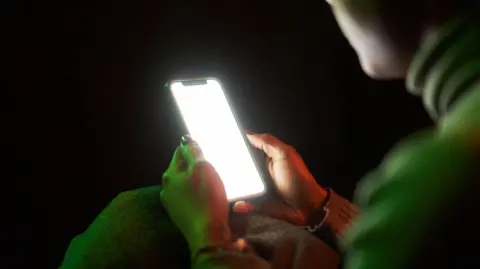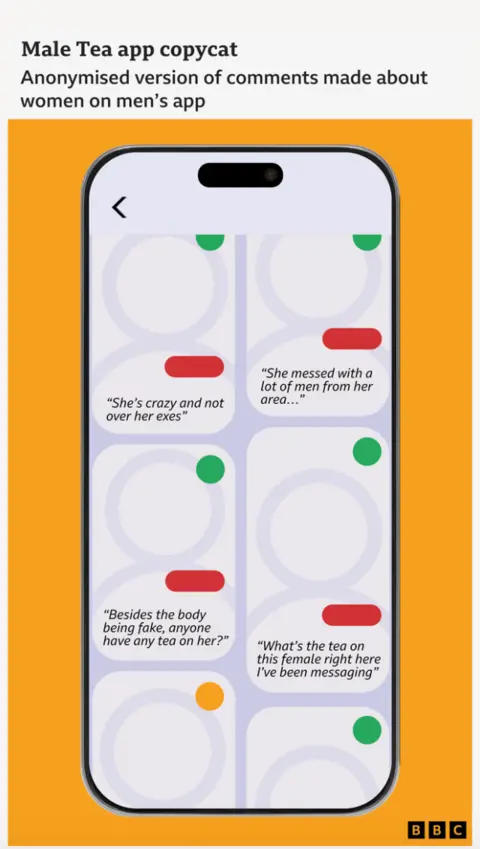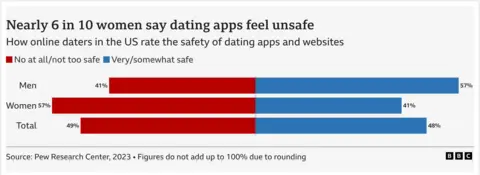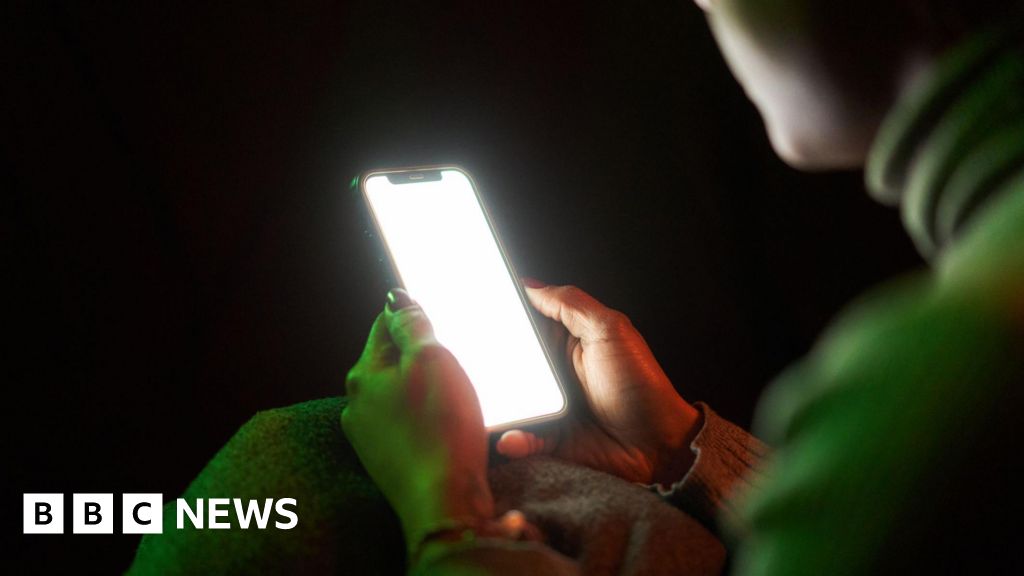Global Disinformation Unit, BBC World Service
 Getty Images/ Carlos Barquero
Getty Images/ Carlos BarqueroSally was stalked by her ex-boyfriend.
After ending their relationship, he would turn up at work – and even her friends’ houses. She eventually had to move.
When she finally got back on to the dating scene, she was wary. She decided to sign up for a new app where women could do background checks and share experiences of men they were dating.
Users of the US-based Tea Dating Advice app, which is only available in America, could flag if potential partners were married or registered sex offenders.
They could run reverse image searches to check against people using fake identities. It was also possible to mark men as red or green flags, and share unproven gossip.
The app was founded in 2023 but climbed the charts in the US to the number one spot in July this year. It reportedly attracted more than a million users.
Sally, whose name has been changed to protect her identity, thought it was interesting to read what was being said about men in her area. But she found it “gossip-y” and that some of the information on it was unreliable.
In late July, the app was hacked. Over 70,000 images were leaked and posted on the online message board 4chan – including IDs and selfies of users which were meant to have been for verification purposes only and “deleted immediately”.
The leak was seized on by misogynist groups online, and within hours, several websites had been created to humiliate the women who’d signed up.
Two maps were published on social media, showing 33,000 pins spread across the United States. Fearing the worst, Sally zoomed in, looking for her home.
She found it – although it wasn’t linked to her name, her exact address was highlighted for anyone to see.
She was worried her stalker ex-partner could now track her down. “He didn’t know before where I lived or worked and I’ve gone to great lengths to keep it that way,” she says. “I’m very freaked out.”
The BBC alerted Google of the two maps hosted on Google Maps purporting to represent the locations of women who had signed up for Tea.
The company said the maps violated their harassment policies and deleted them. Since the breach, more than 10 women have filed class actions against the company which owns Tea.
A spokesperson for Tea app said they were “working to identify and notify users whose personal information was involved and notify them under applicable law” and that affected users would be “offered identity theft and credit monitoring services”.
They also said that they “bolstered resources” to enhance security for current membership, that they’re “proud of what [they’ve] built”, and that their “mission is more vital than ever”.
Misogynists ‘rank’ leaked selfies
Since the breach, the BBC has found websites, apps and even a “game” featuring the leaked data which encourages harassment towards women who had joined the app.
The “game” puts the selfies submitted by women head-to-head, instructing users to click on the one they prefer, with leaderboards of the “top 50” and “bottom 50”. The BBC could not identify the creator of the website.
Users outside of the misogynistic groups were also reposting content deriding the appearance of women on X and TikTok.
Copycat Tea apps for men have also proliferated – but there’s no suggestion the men are doing this for their safety. Instead, users post harsh derogatory reviews of women.

In screen recordings seen by the BBC, users comment on women’s sexuality and post intimate images of women without their consent in the apps.
The BBC also identified more than 10 “Tea” groups on the messaging app Telegram where men share sexual and apparently AI-generated images of women for others to rate or gossip. They post the women’s social media handles, revealing their identities.
A spokesperson for Telegram said that “illegal pornography is explicitly forbidden” and “removed when discovered”.
John Yanchunis, a lawyer representing one of the women against the company that owns the app, said she had been subject to immense online abuse.
“It caused a tremendous amount of emotional distress,” he told the BBC. “She became the subject of ridicule.”
It is unsurprising that the leak was exploited.
The app had drawn criticism ever since it had grown in popularity. Defamation, with the spread of unproven allegations, and doxxing, when someone’s identifying information is published without their consent, were real possibilities.
Men’s groups had wanted to take the app down – and when they found the data breach, they saw it as a chance for retribution.
“This leak was picked up by misogynist communities as a great cause and one that they obviously take a lot of pride in,” says Callum Hood, head of research at the Centre for Countering Digital Hate.
More than 12,000 posts on 4Chan referenced Tea Dating app from 23 July, three days before the leak, to 12 August, he adds.
A rift between men and women?
Online, the Tea app leak is being referred to as part of a “gender war” and the final straw in heterosexual dating.
There is growing evidence that suggests that heterosexual young people are turning away from traditional dating and long-term romantic relationships.
Negative experiences in online dating are adding to these tensions.
A 2023 Pew research found that in the US, over half of women’s experiences on dating apps have been negative, with women being more likely to report unwanted behaviours from men and feeling unsafe on dating apps.

Dr Jenny Van Hooff, a sociologist at Manchester Metropolitan University, says the perceived lack of safety impacts how many young women may want to take part in online dating.
Unlike meeting partners through friends or work, there are fewer repercussions for poor online dating behaviour.
“Women’s experiences of the opposite sex on dating apps is a feeling of fear and lack of trust,” she says. “Misogyny is just getting more entrenched in dating.”
Previous incarnations to the Tea app, such as ‘Are We Dating the Same Guy’ social media groups with thousands of followers, have existed for years globally.
At first, they were hailed as a new way to hold men accountable. But, like Tea, controversy followed, and many men felt misrepresented by what was posted.
With reportedly more than a million users, the Tea App took this concept to a new scale.
But experts have also questioned possible profit motivations behind the app, alongside the trustworthiness of the information posted.
For women wishing to use the app for safety, verifying the information can be challenging. Meanwhile, men, who are unable to access the app, have no way of knowing if false information is posted about them.
Dr Van Hooff said the leak was “proving women’s point to why this app was felt to be necessary”.
“It’s definitely not disabusing these women of any thoughts they have about men and male behaviour.”
She believes women’s safety has been compromised, and men have felt their actions were taken out of context and exploited for gossip.
For Sally, the leak has impacted her sense of protection.
“I’m moving in with loved ones just to feel safe,” she says.


